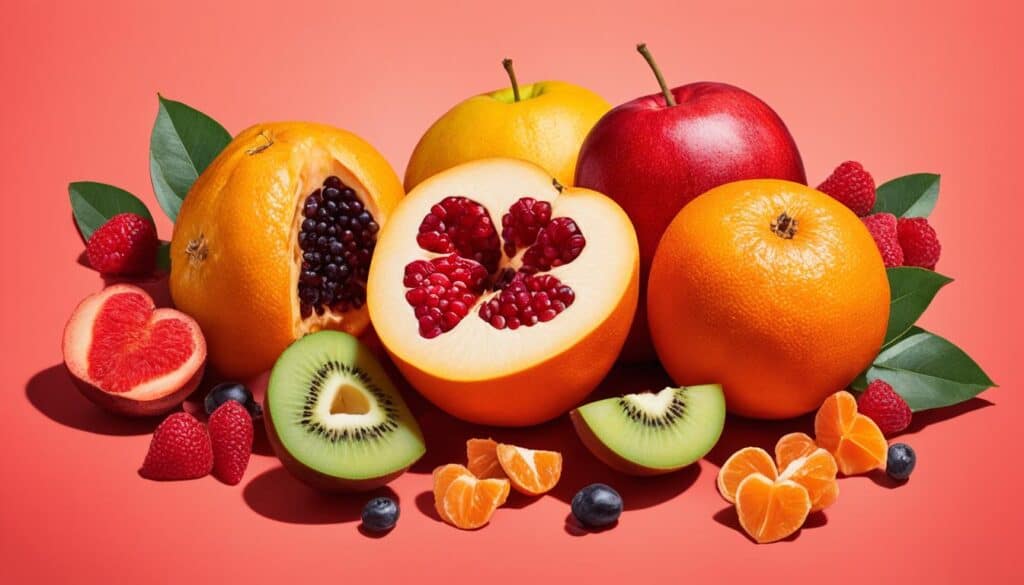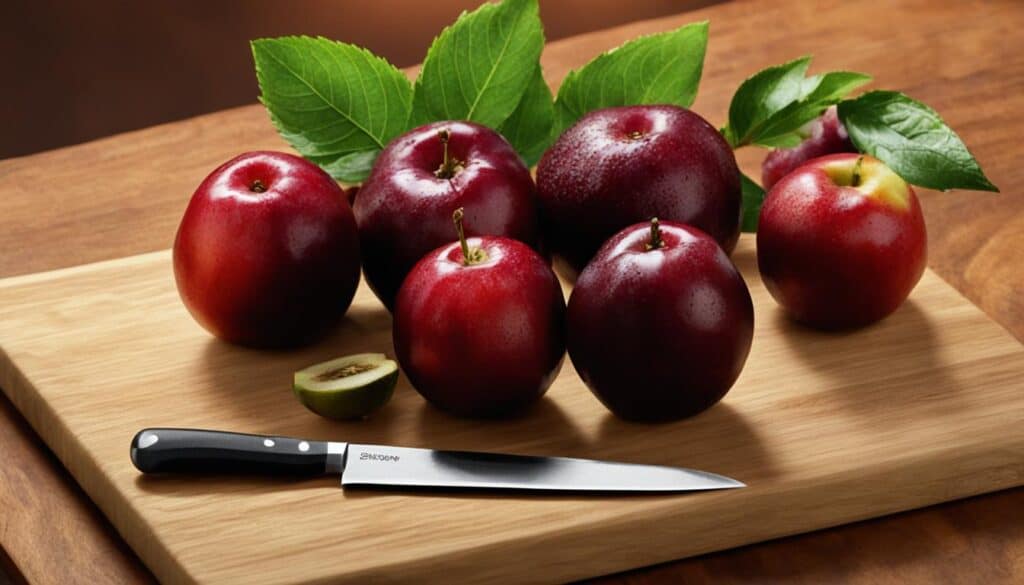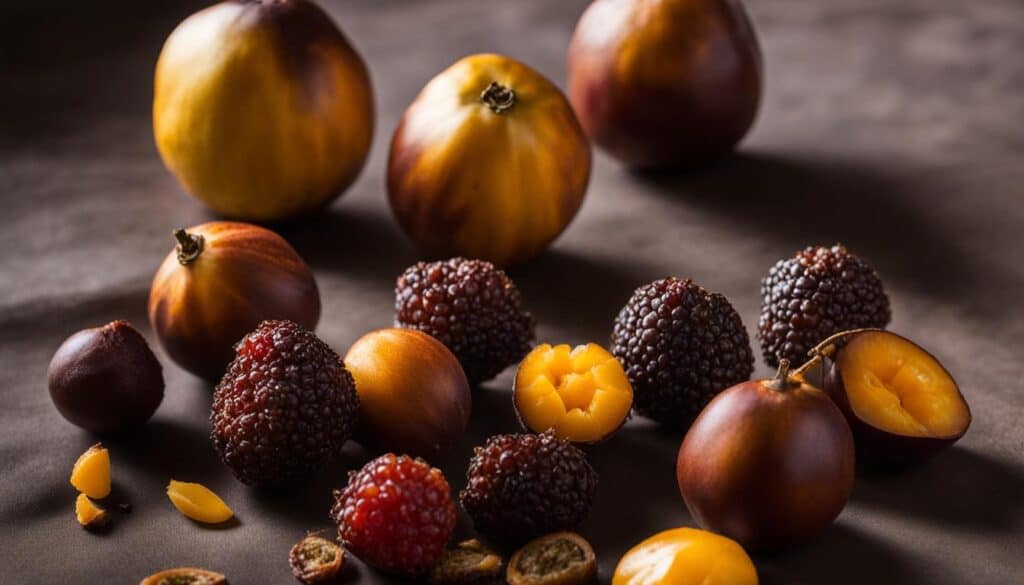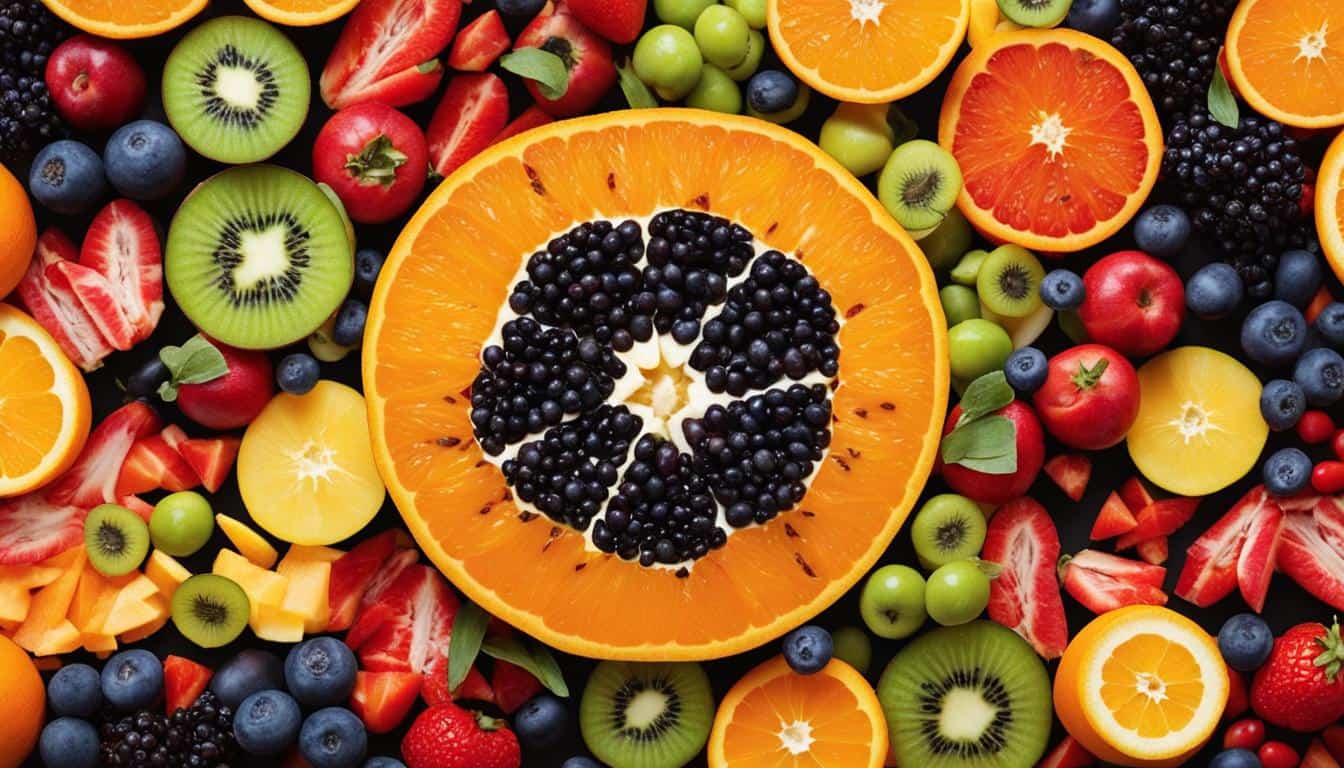Greetings! Today, I am excited to introduce you to the wonderful world of Sharon fruit. Have you ever wondered what sharon fruit actually is? Well, let me enlighten you. Sharon fruit is another name for persimmon, a unique fruit that has been gaining popularity in various countries, including the United States.
Originally grown in China and Japan, sharon fruit made its way to India only a century ago, thanks to European settlers. Since then, it has made its mark as a delicious and nutritious addition to our diets. But what makes sharon fruit so special? Let’s explore its benefits, nutrition, and taste.
Key Takeaways:
- Sharon fruit, also known as persimmon, is a unique fruit that has gained popularity in various countries, including the United States.
- It is rich in vitamins C, A, E, K, B, as well as important minerals like potassium, magnesium, calcium, phosphorous, manganese, and iron.
- Sharon fruit offers a range of health benefits, including reducing inflammation, supporting heart health, aiding digestion, enhancing eye health, and improving skin texture.
- When ripe, sharon fruit has a succulent and sweet taste.
The Persimmon Plant: A Tree with Nutritious Fruits
Sharon fruit, also known as persimmon, is derived from the deciduous Diospyros kaki tree. This tree is native to China, Korea, and Japan and is recognized as the most widely grown variety of persimmon in the world. In North America, another variant called Diospyros virginiana is cultivated.
The Diospyros kaki tree is a majestic tree that can grow up to 60 feet tall. It features round tops and bluish-green oblong leaves. During the autumn season, these leaves transform into vibrant shades of orange, yellow, and red, adding beauty to the landscape. The tree blooms with bright pink or pale white flowers, which eventually develop into the beloved sharon fruit during the late fall to winter season.
“Sharon fruit is often interchangeably referred to as persimmon.”
The ripe persimmon fruits are characterized by their yellowish-orange to deep reddish-orange color and have a succulent and sweet taste. The sharon fruit owes its name to the fertile Sharon Plain in Israel, where it was successfully grown for exportation. However, it is important to note that sharon fruit is often used as a general term for persimmons, encompassing various cultivars such as Fuyu, Hachiya, and American persimmons. These cultivars may exhibit slightly different characteristics in terms of taste, texture, and shape.
Sharon Fruit vs Persimmon
While sharon fruit is commonly referred to as persimmon, it’s worth noting that the term “persimmon” encompasses a broader category of fruits. Persimmons, including the popular sharon fruit, belong to the genus Diospyros. However, within this genus, there are different species and cultivars that produce distinct types of persimmons. The sharon fruit, scientifically known as Diospyros kaki, is just one variety of persimmon.
To highlight the differences, here is a comparison:
| Characteristic | Sharon Fruit (Diospyros kaki) | Other Persimmon Varieties |
|---|---|---|
| Origin | Native to China, Korea, and Japan | Native to various regions worldwide, including North America |
| Color | Yellowish-orange to deep reddish-orange | Varies depending on the cultivar (e.g., orange, red, yellow) |
| Taste | Succulent and sweet | Varies depending on the cultivar (e.g., sweet, tart, astringent) |
| Shape | Rounded and slightly flattened | Varies depending on the cultivar (e.g., acorn-shaped, elongated, tomato-shaped) |
Despite these differences, it’s important to note that all persimmons, including sharon fruit, offer unique flavors, nutritional value, and health benefits. Now that we’ve explored the origins and characteristics of the persimmon plant, let’s delve into the nutritional value of sharon fruit in the next section.
Nutritional Value of Sharon Fruit
Sharon fruit, or persimmon, is an incredibly nutritious fruit packed with essential vitamins, minerals, and bioactive compounds. It offers numerous health benefits and can be a valuable addition to any diet.
Vitamins
Sharon fruit contains a wide range of vitamins that contribute to overall health and well-being. It is particularly rich in vitamin C, which supports the immune system and acts as a powerful antioxidant. Vitamin A promotes healthy vision, while vitamin E protects against oxidative damage. Vitamin K plays a crucial role in blood clotting, and various B vitamins are essential for energy metabolism and brain function.
Minerals
In addition to vitamins, sharon fruit is a great source of minerals that are vital for various bodily functions. It is high in calcium, promoting strong bones and teeth, and magnesium, which supports nerve and muscle function. Phosphorus is important for energy production and maintaining healthy cells, while potassium helps regulate blood pressure. Sharon fruit also contains trace minerals like manganese and iron, which are involved in enzyme activity and oxygen transport in the body.
Bioactive Compounds
Sharon fruit is rich in bioactive compounds that provide numerous health benefits. Polyphenols, such as tannins, catechins, and proanthocyanidins, possess potent antioxidant properties, protecting cells from damage caused by free radicals. These compounds also have anti-inflammatory effects, reducing the risk of chronic diseases. Additionally, sharon fruit contains carotenoids, such as beta-carotene and lutein, which are important for eye health and overall antioxidant protection.
To summarize, sharon fruit is a nutritional powerhouse, providing a wide array of vitamins, minerals, and bioactive compounds that contribute to overall health and well-being. Incorporating sharon fruit into your diet can help support immune function, protect against oxidative stress, and reduce the risk of chronic diseases.
| Nutrient | Amount per 100g |
|---|---|
| Calories | 81 |
| Fat | 0.4g |
| Carbohydrates | 21g |
| Fiber | 3.6g |
| Vitamin C | 20.5mg |
| Vitamin A | 81µg |
| Vitamin E | 0.4mg |
| Vitamin K | 2.6µg |
| Calcium | 8mg |
| Magnesium | 9mg |
| Phosphorus | 17mg |
| Potassium | 161mg |
| Manganese | 0.1mg |
| Iron | 0.2mg |
Note: Nutrient values may vary depending on the ripeness and size of the fruit.
Health Benefits of Sharon Fruit
Sharon fruit, also known as persimmon, is not only delicious but also packed with numerous health benefits. Incorporating this nutritious fruit into your diet can have a positive impact on various aspects of your well-being. Let’s explore the incredible health benefits that sharon fruit offers:
1. Diminishes Inflammation
The antioxidants present in sharon fruit help combat inflammation in the body. Chronic inflammation is associated with various health issues, including heart disease, diabetes, and certain types of cancer. Adding sharon fruit to your diet can help reduce inflammation and promote overall wellness.
2. Promotes Heart Wellness
Sharon fruit contains potassium, a mineral known for its heart-healthy properties. Potassium helps lower blood pressure, reducing the risk of heart disease and stroke. Additionally, the anthocyanins found in sharon fruit contribute to maintaining a normal heartbeat, further supporting cardiovascular health.
3. Alleviates Digestive Disorders
The high fiber content of sharon fruit aids in digestion and prevents common digestive problems like bloating and constipation. Including sharon fruit in your diet can promote a healthy digestive system and ensure regular bowel movements.
4. Enhances Eye Health
Sharon fruit is a rich source of vitamin A and carotenoids, which are essential for maintaining good vision and preventing eye diseases such as cataracts and macular degeneration. Consuming sharon fruit regularly can help protect the health of your eyes and preserve your vision.
5. Enriches Skin Texture
The vitamins C and E, along with the catechin antioxidants found in sharon fruit, contribute to improving skin health. These nutrients help rejuvenate the skin, promote collagen production, and protect against oxidative stress, resulting in a healthier and more youthful complexion.
Sharon fruit’s health benefits extend beyond these specific areas, thanks to its diverse array of vitamins, minerals, antioxidants, and dietary fiber. Including this versatile fruit in your diet can support your overall well-being and contribute to a healthier lifestyle.

With all these amazing health benefits, it’s no wonder that sharon fruit has become increasingly popular among health-conscious individuals. So, why not add this nutritious and delicious fruit to your daily routine and reap the rewards it has to offer?
How to Incorporate Sharon Fruit into Your Diet
Looking to add some variety to your diet? Sharon fruit, with its delightful taste and nutritional benefits, is a great choice. Whether eaten fresh, dried, or used in cooking, there are plenty of ways to enjoy this versatile fruit. Here are some ideas on how to incorporate sharon fruit into your daily meals:
1. Enjoy as a Fresh Snack
One of the simplest ways to eat sharon fruit is to enjoy it fresh. Choose ripe fruits that are light yellowish-orange to deep reddish-orange in color. They should feel soft and have a sweet aroma. Simply peel the fruit and bite into its succulent flesh for a refreshing and healthy snack.
2. Add to Salads
Sharon fruit can add a vibrant burst of flavor to your salads. Slice the fruit into bite-sized pieces and toss it with your favorite greens, nuts, and dressing. The sweet and tangy taste of sharon fruit pairs well with a variety of salad ingredients.
3. Blend into Smoothies
For a delicious and nutritious smoothie, blend sharon fruit with other fruits like bananas, strawberries, or mangoes. Add some yogurt or milk, and a dash of honey or cinnamon for extra flavor. This refreshing beverage is perfect for a quick breakfast or a post-workout snack.
4. Make Fruit Jams and Sauces
Sharon fruit can be transformed into flavorful jams or sauces. Cook the fruit with sugar, lemon juice, and a pinch of salt until it turns into a thick, spreadable consistency. Use it as a topping for toast, pancakes, or waffles, or as a glaze for meats and roasted vegetables.
5. Cook in Curries and Entrees
Add sharon fruit to your favorite curries or entrees for a unique twist. The fruit’s natural sweetness complements both savory and spicy dishes. It pairs well with meats like chicken, pork, or lamb, as well as vegetarian options like tofu or chickpeas.
6. Create Delicious Desserts
Sharon fruit can be the star ingredient in delightful desserts. Use it in pies, tarts, or crumbles for a burst of fruity flavor. You can also make creamy puddings, custards, or sorbets with sharon fruit as a refreshing treat after a meal.
7. Try Dried Sharon Fruit
Dried sharon fruit, also known as hoshigaki, is a traditional Japanese snack that can be enjoyed as is or used in cooking. The drying process enhances the sweetness of the fruit and gives it a chewy texture. Snack on it as a healthy alternative to sugary treats, or add it to trail mixes, granola bars, or baked goods for an extra boost of flavor.
With these tips, you can easily incorporate sharon fruit into your diet and enjoy its unique taste and nutritional benefits. Get creative in the kitchen and explore the endless possibilities this versatile fruit has to offer.
| Benefits of Incorporating Sharon Fruit into Your Diet | How to Incorporate Sharon Fruit |
|---|---|
| Rich in vitamins and minerals | Eat fresh as a snack |
| Offers antioxidants and dietary fiber | Add to salads |
| Promotes heart health | Blend into smoothies |
| Aids digestion | Make fruit jams and sauces |
| Enhances eye health | Cook in curries and entrees |
| Improves skin texture | Create delicious desserts |
| Dried sharon fruit as a snack or cooking ingredient | Try dried sharon fruit (hoshigaki) |
Sharon Fruit Seasonality and Availability
Sharon fruit, also known as persimmon, is a delightful fruit that can be enjoyed during a specific season. Typically, sharon fruit is in season from late fall to winter. The exact seasonality may vary depending on the location and climate.
In the United States, sharon fruit is readily available in grocery stores and farmers markets during the fall and winter months. This is the perfect time to indulge in its unique flavors and reap its nutritional benefits.
When selecting sharon fruit, it is essential to choose ripe fruits for the best taste and texture. Look for fruits that are light yellowish-orange to deep reddish-orange in color. They should feel soft to the touch and have a sweet aroma.
For those who cannot get enough of sharon fruit, dried sharon fruit or hoshigaki is a wonderful option. Dried sharon fruit is available year-round and has a longer shelf life, making it a convenient and delicious snack or ingredient for cooking.

How to Determine Sharon Fruit Ripeness
Determining the ripeness of sharon fruit is crucial for optimal taste and enjoyment. Ripe sharon fruit should be soft to the touch and have a slightly wrinkled skin. It should give in slightly when pressed, indicating that it is juicy and mature. Avoid sharon fruit that feels excessively hard or has a firm skin, as these may not be fully ripe and can have an unpleasant astringent taste.
It is also important to note that different varieties of sharon fruit may have slightly different ripening characteristics. Experiment with different fruits and observe their ripening patterns to find your preferred level of ripeness.

“Ripe sharon fruit should be soft to the touch and have a slightly wrinkled skin.”
The History and Culture of Sharon Fruit
Sharon fruit, also known as persimmon, has a fascinating history and holds cultural significance in various regions. Its origins can be traced back to China, where it was first cultivated. Over time, it spread to Japan and other countries, gaining popularity and becoming an important part of their cultural traditions.
In Japan, sharon fruit became deeply intertwined with autumn and winter festivities. It is often associated with good luck, longevity, and transformation. The fruit has inspired Japanese poetry, artwork, and culinary traditions, showcasing its profound cultural influence within the country.
“Sharon fruit, or persimmon, symbolizes good luck, longevity, and transformation in Japanese culture.”
Additionally, sharon fruit has found diverse uses beyond its culinary applications. In traditional medicine, it has been beneficial for its medicinal properties. The fruit’s extract has been utilized in traditional remedies for various ailments.
The versatility of sharon fruit extends to other industries as well. Its wood has been utilized for making stains and sealants, contributing to the creation of vibrant wooden crafts. It has also been used in the paper-making process, providing a unique texture and appearance to paper products.
The durability of sharon fruit wood has made it a choice material for construction and furniture-making. Its unique grain patterns and natural beauty add a touch of elegance to architectural designs and furniture pieces.
Overall, the history and culture of sharon fruit demonstrate its enduring influence, both as a delicious fruit and as a symbol of tradition and craftsmanship.
Conclusion
Sharon fruit, also known as persimmon, is a delicious and nutritious addition to any diet. With its rich content of vitamins, minerals, antioxidants, and dietary fiber, incorporating sharon fruit into your meals can have numerous health benefits. Not only does it support heart health, but it also enhances digestion, improves eye health, and promotes overall wellness.
Whether you prefer enjoying sharon fruit fresh, dried, or cooked, there are various ways to savor its unique taste and reap the nutritional rewards. Add it to salads, smoothies, sauces, or desserts like pies and puddings. You can even try dried sharon fruit, known as hoshigaki, as a delightful snack or ingredient in your favorite recipes.
Discover the wonders of sharon fruit and indulge in its delightful flavors. Embrace the nutritional value it brings to your table and explore the countless possibilities of incorporating this versatile fruit into your everyday meals. Make sharon fruit a part of your healthy lifestyle and enjoy the many benefits it offers for your well-being.
FAQ
What are Sharon fruit?
Sharon fruit is another name for persimmon, a unique fruit that is rich in vitamins and minerals. It is known for its succulent and sweet taste.
What are the benefits of Sharon fruit?
Sharon fruit offers a range of health benefits, including reducing inflammation, supporting heart health, aiding digestion, enhancing eye health, and improving skin texture.
What is the nutritional value of Sharon fruit?
Sharon fruit is low in calories and fat and contains essential nutrients such as vitamins C, A, E, K, and various B vitamins, as well as minerals like potassium, magnesium, calcium, and iron.
How does Sharon fruit taste?
Sharon fruit has a succulent and sweet taste, making it enjoyable to eat fresh or in various recipes.
How can I incorporate Sharon fruit into my diet?
Sharon fruit can be eaten fresh, dried, or used in cooking. It can be added to salads, smoothies, fruit jams, sauces, curries, or desserts like pies and puddings.
When is Sharon fruit in season?
Sharon fruit is typically in season from late fall to winter, although the exact seasonality may vary depending on the location and climate.
How do I determine the ripeness of Sharon fruit?
Ripe Sharon fruit should be soft to the touch and have a slightly wrinkled skin. It should give in slightly when pressed, indicating that it is juicy and mature.
What is the origin of Sharon fruit?
Sharon fruit, also known as persimmon, originated in China and was later introduced to Japan and other countries. It is now grown in various parts of the world.
Is Sharon fruit the same as persimmon?
Yes, Sharon fruit is another name for persimmon. The terms are often used interchangeably.
Is there a difference between Sharon fruit and persimmon?
Sharon fruit is a variety of persimmon. However, there are different varieties of persimmon with varying characteristics.





Leave a Reply